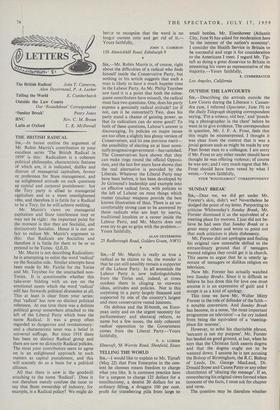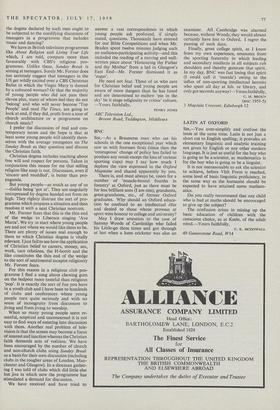'SUNDAY BREAK'
SIR,—Dear me, we did get under Mr. Forster's skin, didn't we? Nevertheless he dodged the point of my letter. Purporting to criticise Whitsunday's Sunday Break, Mr. Forster dismissed it as the equivalent of a meeting place for morons. I just did not be- lieve he had seen that Sunday Break or a great many others and wrote to point out that such criticism is plain dishonesty.
Mr. Forster did not apologise and finding his original view untenable shifted to the extraordinary ground that if teenagers wanted religion they could get it in church. This seems to argue that he is utterly ig- norant of teenagers or dislikes religion on television.
Now Mr. Forster has actually watched two Sunday Breaks. Since it is difficult to believe he has done this for love one must assume it is an expression of guilt and I accept it as a kind of apology.
This time we have Mr. Walter Mitty Forster in the role of defender of the faith— a notable conversion. And Sunday Break has become, in a sense, 'the most important programme on television'—a far cry indeed from being the equivalent of a 'meeting- place for morons'.
However, to echo his charitable phrase, 'sarcasm is not my purpose'. Mr. Forster has landed on good ground, at last, when he says that the Christian faith asserts dogma and that the dogma ought not to be watered down. I assume he is not accusing the Bishop of Birmingham, the R.C. Bishop of Leeds, Dr. George MacLeod, Dr. Donald Soper and Canon Patey or any other churchman of 'altering the message'. If so, remembering his original views formed when innocent of the facts, I must ask for chapter and verse.
The question may be therefore whether the dogma declared by such men ought to be subjected to the unedifying discussion of teenagers in a programme that includes music and dancing?
We have in British television programmes like About Religion and Living Your Life which, I am told, compare more than favourably with CBS's religious pro- grammes. Unlike these, Sunday Break is aiming at teenagers. Surely Mr. Forster does not seriously suggest that teenagers in the US get wildly excited over a CBS Christmas Ballet in which the Virgin Mary is danced by a coloured woman? Or that the majority of young people who did not pass their eleven plus, many of whom feel they do not 'belong' and who will never become 'Top People' and read The Tittles, are going to look at and, if they did, profit from a tour of church architecture or a programme on church music?
I prefer the discussion of real and con- temporary issues and the hope is that at least some young people will identify them- selves with the average youngsters on The Sunday Break as they question and discuss the Christian faith.
Christian dogma includes teaching about free will and respect for persons. Taken in conjunction this means for me that selling religion like soap is out. Discussion, even if 'sincere and muddled', is better than pro- paganda.
But young people—as much as any of us —dislike being 'got at'. They are singularly unimpressed by dogma handed out from on high. They rightly distrust the sort of pro- gramme which prepares a situation and then resolves it with a neat Christian nostrum.
Mr. Forster fears that this is the thin end of the wedge to Liberace singing 'Ave Maria'. We try to start where young people are and not where we would like them to be. There are plenty of issues real enough to them to which Christian dogma is vitally relevant. I just fail to see how the application of Christian belief to careers, money, sex, work, race relations, the H-bomb and the like constitutes the thin end of the wedge to the sort of sentimental escapist religiosity Mr. Forster fears.
For this reason in a religious club pro- gramme I find a song about chewing gum on the bedpost more tasteful than religious 'pop'. It is exactly the sort of fun you have in a youth club and I have been to hundreds of clubs and conferences where young people turn quite seriously and with no sense of incongruity from discussion to jiving and from jiving to worship.
When so many young people seem re- sentful, sceptical and unconcerned it is not easy to find ways of entering into discussion with them. Another real problem of tele- vision is that the screen may become a focus of interest and inaction whereas the Christian faith demands acts of volition. We have been encouraged by the number of church and non-church clubs using Sunday Break as a basis for their own discussion (including clubs in the tougher areas of London, Man- chester and Glasgow). In a diocesan gather- ing I was told of clubs which did little else but jive in which now the programme has stimulated a demand for discussion.
We have received and have tried to answer a vast correspondence in which young people ask profound, if simply stated, questions. Thousands have entered for our Bible Competitions and when Mr. Braden spent twelve minutes judging such an audience-participating activity—and this included the reading of a moving and well- written piece about 'Honouring thy Father and thy Mother' from a lad in Glasgow's East End—Mr. Forster dismissed it as 'sugar'.
He need not fear. Those of us who care for Christian belief and young people are aware of more dangers than he has listed and are determined to eschew 'pie in the sky' be it stage religiosity or critics' culture. —Yours faithfully, Broom Road, Teddington, Middlesex







































 Previous page
Previous page